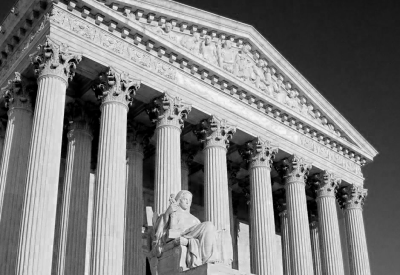Legal System
A just and fair legal immigration system upholds due process and adherence to the rule of law, while effectively managing immigration. Our efforts work to uphold the best version of the system, holding government entities accountable for fairly enforcing policies and addressing injustices at all levels of government.
What does the constitution say about due process?
The Fifth Amendment to the Constitution says clearly that no person shall be deprived of life, liberty, or property without the due process of law. Note that this says person, not citizen, and over the years the Supreme Court has consistently ruled that the Due Process Clause applies to all people in the United States.Do non-citizens have the right to due process in the U.S.?
Yes. The Constitution guarantees due process rights to all "persons," not just citizens. This means non-citizens, including undocumented immigrants, are entitled to fair treatment under the law. This includes the right to defend themselves in court. But recent Trump administration policies that speed up deportations and limit access to legal representation make it harder for non-citizens to get their fair day in court.- Access to legal representation Access to legal counsel is an essential part of our justice system and our democracy. In the criminal justice system, anyone facing even one day in jail gets a lawyer if they can't afford one. But immigrants facing deportation usually don't get that chance.The research is clear – the most effective way to ensure some level of due process for people navigating our complicated immigration system is for them to have trained attorney at their side. But Trump administration is now working to strip attorneys from as many people as possible, all in the name of increasing its deportation numbers. This attempt to eliminate basic due process will hurt people who already have few options.
- Fair day in court Due process guarantees that individuals have the opportunity to defend themselves in court. This includes non-citizens facing deportation.
Why is due process important?
We are seeing right now the importance of due process when it comes to President Trump's actions to carry out the so-called Alien Enemies Act, a 1798 wartime law that permits people to be deported outside of the normal framework of immigration law. President Trump has alleged that this law allows him to simply point at any person, declare them to be an alien enemy, and kick them out of the country without ever having a chance to see a judge. Thankfully, the Supreme Court said that is not true, and in a unanimous decision, ruled that people can challenge the Trump administration's invocation of the Alien Enemies Act. That is why due process is so important, because it means that no person can be rounded up and sent to another country without a chance to go to court and make the government prove their case.How is the American Immigration Council working to protect due process?
- We serve thousands of individuals in immigration detention centers through the Immigration Justice Campaign, our initiative with the American Immigration Lawyers Association. The Justice Campaign provides free legal services for immigrants who would otherwise have to navigate our complicated immigration system without a lawyer.
- We use the courts to demand a fair process for immigrants. Our litigation team is fighting back against the Trump administration’s blatant disregard for due process including filing a lawsuit challenging their illegal detention of immigrants in El Salvador’s notorious Terrorism Confinement Center (CECOT).

Board of Immigration Appeals Rules Not to Reopen Old Deportation Cases
A decision by the Board of Immigration Appeals (BIA) last week provides yet more evidence that broken laws create broken government. By refusing to protect eligible applicants for adjustment of status from deportation, the Board eased the way for the Immigration and Customs Enforcement (ICE) to deport someone whose legitimate green card application is pending with United States Citizenship and Immigration Services (USCIS). Read More

U.S. Supreme Court Considers “Collateral Consequences” for Immigrants in Criminal Cases
Today, the U.S. Supreme Court heard arguments in a case posing the question: “If a criminal defense lawyer tells his or her client not to worry about the immigration consequences of pleading guilty, but that advice is wrong and in fact the client will be deported as a result of pleading guilty, can the client withdraw the plea?” In this case, Padilla v. Kentucky, the Supreme Court of the State of Kentucky said no: even incorrect advice about the immigration result is not a sufficient reason to reopen a case because deportation (now known officially as “removal”) from the U.S. is a “collateral” consequence—that is, not something directly related to the criminal case. Kentucky’s lawyer argued today that the High Court should uphold that decision. Read More

Supreme Court to Hear Two Cases Affecting Fair Process for Immigrants
Today, the United States Supreme Court opens its October session. Among the cases it will hear this term, two may have a significant effect on immigrants. The first case involves the intersection of the criminal justice system and immigration and the important role that lawyers play in safeguarding the rights of immigrants. The second case deals with immigrants’ access to federal court review—review which provides necessary oversight of government decision-making in immigration cases. These cases present the Supreme Court with opportunities to reaffirm that immigrants must be afforded fair process and a meaningful opportunity to be heard. Read More

Immigrants with Mental Disabilities Are Deprived Their Day in Court
The U.S. legal system is premised on the idea that every party in a case is afforded his or her day in court and a meaningful opportunity to be heard. Yet, for individuals with mental disabilities facing deportation from the United States—including those whose removal will mean being permanently barred from ever returning—that day may never arrive. Read More

The Rush to Limit Judicial Review
Access to an independent judiciary with the power to hold the government accountable in its dealings with individuals is a founding principle of the United States. In contrast, imagine a system where there is no access to independent judgment; where, instead, the referee works for the opposing team. The House of Representatives took a step away from this founding principle by passing the Border Protection, Antiterrorism, and Illegal Immigration Control Act (H.R. 4437) on December 16, 2005. A provision of the bill would erode access to independent judgment by severely restricting access to the federal courts for individuals in removal (deportation) proceedings. This provision is part of a long string of efforts by proponents of restrictive immigration policies to limit the jurisdiction of the federal courts over immigration cases. Read More

Crossing Borders Alone: The Treatment of Unaccompanied Children in the United States
Children who travel unaccompanied to the United States experience not only the trauma of family separation and the frequently predatory behavior of the traffickers who bring them, but also harsh treatment by an immigration bureaucracy that often incarcerates them with little access to legal counsel or professional support. Read More
Make a contribution
Make a direct impact on the lives of immigrants.

